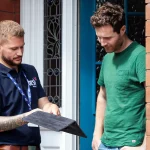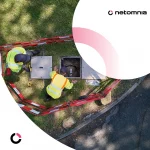Examining UK Prime Minister Rishi Sunak’s Position on Telecoms

The UK Government’s former Chancellor, Rishi Sunak, has today formally been appointed as the country’s next Prime Minister and the third to enter 10 Downing Street since the summer, after the roller coaster rides of Boris Johnson and Liz Truss. We take a quick look at what this might mean for broadband, mobile and internet policy.
At the time of writing it’s unclear, at least in terms of his policy around telecoms and digital connectivity, what Sunak will do differently from his predecessors. Sunak is known to have broadly supported the Government’s £5bn Project Gigabit broadband rollout, which aims to make gigabit-capable internet connections available “nationwide” (realistically 99%+) by 2030.
During his time as Chancellor, he also visited a number of fibre optic network builds, such as those from B4RN, Openreach and Jurassic Fibre. Likewise, he supports the £1bn industry-led Shared Rural Network project (inc. £500m of public investment), which is working to extend geographic 4G coverage to 95% of the UK by the end of 2025.
Advertisement
In many ways, we expect Sunak to be a continuity candidate, at least when it comes to the telecoms and broadband side of things (wider tax and spending policy is another matter entirely). Much like Liz Truss, he also appears to favour taking a softer approach to the Online Safety Bill (OSB), which seeks to regulate what people say online, but which in its current form risks becoming a Draconian mess of unworkable measures that stifles freedom of expression by the backdoor.
Rishi Sunak, UK Prime Minister, said:
“The United Kingdom is a great country but we face a profound economic crisis. The choice our Party makes now will decide whether the next generation of British people will have more opportunities than the last.
That’s why I am standing to be your new Prime Minister and Leader of the Conservative Party. I want to fix our economy, unite our Party and deliver for our country.
I served as your Chancellor, helping to steer our economy through the toughest of times. The challenges we face now are even greater. But the opportunities – if we make the right choice – are phenomenal.
I have the track record of delivery, a clear plan to fix the biggest problems we face and I will deliver on the promise of the 2019 manifesto. There will be integrity, professionalism and accountability at every level of the government I lead and I will work day in and day out to get the job done.
I am asking you for the opportunity to help fix our problems. To lead our Party and country forward towards the next General Election, confident in our record, firm in our convictions and ready to lead again.”
In an ideal world, we’d like to see Sunak put more resources into the Building Digital UK (BDUK) team to help them tackle the rollout of gigabit-capable broadband in a timely fashion, as well as to press the Home Office to conclude their visa review as soon as possible (this is expected to make it easier for UK telecoms operators to recruit fibre engineers from abroad).
Sunak’s Government should also give serious consideration to bringing back 100% relief from business rates on new fibre. Scotland already does this, but England and Wales ended their 5-year relief earlier this year and chose not to extend it – an unusual move, given all the effort they’ve put into encouraging the deployment of new full fibre networks up to 2030.
The Government’s so-called “Super Deduction“, which was partly Sunak’s idea and gives a big tax break to businesses that invest in new plant and machinery assets, is also due to expire next year. But admittedly, that was due to be offset in later years by the subsequent increase in the corporation tax rate, although we still think this is something else that could be extended as it did help some broadband deployments.
Advertisement
In addition, it wouldn’t hurt if the Government could set a much more ambitious goal for 5G mobile coverage. The existing target (i.e. “the majority of the population will have access to a 5G signal by 2027“) is already laughably weak, with both EE and Three UK having exceeded that via commercial builds. A stronger target for geographic coverage would have much more credibility.
Sunak has also previously indicated that he would scrap the 5% rate of Value Added Tax (VAT) on domestic energy bills, which perhaps suggests that he might be amenable to the idea of reducing the 20% rate of VAT that still exists on broadband connectivity. Even just reducing it to 5% for Social Tariffs would be a help.
Finally, we hope that Sunak won’t disrupt or delay existing policy work in this area, such as in regard to the legislative changes and new bills that are designed to help speed-up the planning process for new deployments of broadband and mobile infrastructure. But we think any big changes on this front are highly unlikely, as it would risk further delay to an already slow process.
We’ll finish with this comment from analyst firm Assembly Research.
Advertisement
James Robinson, Senior Analyst at Assembly, said:
“Like Truss, Sunak wants to ensure the Online Safety Bill strikes a balance between preserving free speech and protecting children by stopping their exposure to explicit material. His view was that by restricting “legal but harmful” content, the Government risks suppressing free speech. With the bill currently paused, he had wanted to use that window to make changes, but it’s fair to say probably little progress will have been made here. However, given the high profile nature of the recently concluded Molly Russell inquest, it’s likely to be an issue closer to the top of his in-tray.
More broadly concerning big tech, Sunak signalled his intention to crack down on the anti-competitive practices of the largest online platforms by creating a new regulator with “real teeth”. Although his original pledge to take forward the promised Digital Markets legislation this autumn may now see a delay, providing legal backing for the Digital Markets Unit would give it more of the power it needs. Relatedly, Sunak vowed to implement measures to support the sustainability of the newspaper industry and to ensure “fair terms” for publishers in their negotiations with tech firms.
Sunak said precious little during the July–September leadership campaign about connectivity. One of his previous contributions when Chancellor was the “super deduction” tax relief for infrastructure investment. Broadband builders (and BT in particular) have wanted to know whether it will continue. Given the current state of public finances, nothing can be certain, but without it, going beyond today’s 70% gigabit broadband coverage would get that bit harder.
More firmly in his sights is removing what he sees as ‘burdens’ from Brussels and the future of the BBC and Channel 4. As a Brexiteer, Sunak is eager that the UK overhauls the GDPR and replaces it with a new, dynamic data protection regime. He argues this would encourage innovation by domestic tech startups and enable data sharing among public services to tackle crime such as online scams – an issue debated in Parliament only last week. Perhaps more continuous is the suggestion Sunak would look to abolish the BBC licence fee and take forward plans to privatise Channel 4 – something he sees as necessary to help them compete with the likes of Amazon and Netflix.”
Mark is a professional technology writer, IT consultant and computer engineer from Dorset (England), he also founded ISPreview in 1999 and enjoys analysing the latest telecoms and broadband developments. Find me on X (Twitter), Mastodon, Facebook, BlueSky, Threads.net and Linkedin.
« FullFibre Ltd Puts Gigabit Broadband Live in 3 UK Locations






















































They used Truss as an example to show that cutting taxes is bad
Sunak will raise taxes further, not lower, as he is part of the WEF cabal who installed him without even a vote which is unfortunate
Truss wasn’t even elected as PM, she only got the job in the first place as the Tory membership voted for her vs Tory MPs who voted for Sunak.
In anyway, hopefully we learn soon what Sunak’s approach to the industry will be.
It’ll probably be let all the big boy mate not pay their tax – just like his Wife.
Can’t wait for an ACTUAL election!
Truss won the vote from the tory membership. Looks like votes actually don’t matter since we end up with Sunak anyway. I wonder if they will apologize to the members for ignoring their vote
He was in support of the destructive tax hikes, including the very dumb Biden global business tax which will eliminate a possible advantage the UK could’ve had, so the industry will be hit with them on the next budget next week. No need for a crystal ball on that.
@Guest said “Truss wasn’t even elected as PM”
What a stupid idiotic comment, no one is ever elected as Prime Minister here in the UK.
Yeah, that massive rise in corporation tax was cheered on by lots of people too stupid to realise that was a 6% tax on their pensions (whether currently saving into one or drawing a pension from it).
Maybe he’s going to take broadband away from the rural north and give it to rich people in Tunbridge.
He won’t take Broadband away from the North, but surely they don’t need full fibre. The North could do just fine with FTTC and then FTTP could be rolled out much faster in the South.
Looking forward to writing another story like this in the near future, Mark?
I would say 50:50.
With the archaic government systems reducing VAT on social tariffs may be difficult. Reducing VAT across the Board though to 5% should be simply and might be cost neutral if it was just applied to Broadband as it would encourage take up
Must be a nice world you live in to think that. Unfortunately only Rishi’s family and rich friends can pay that level of tax, using loopholes or illegal means to dodge paying what they actually owe.